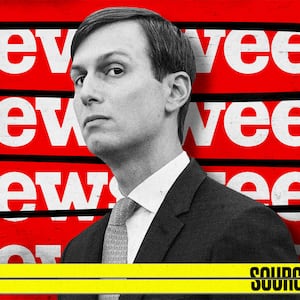Romania’s media market is engulfed in a pay-for-play political scandal which includes newsrooms using the brand names of CNN and Newsweek.
CNN’s Romanian affiliate, Antena 3 CNN, has a TV broadcasting license which precludes it from taking money from political parties outside of designated election campaign periods. Yet that is reportedly exactly what the biggest names in Romanian news media have been doing through their websites, which are unregulated.
Investigative reports based on insider evidence have exposed money being transferred to media companies via intermediaries by the very political parties they are supposed to hold to account.
“It’s a big problem for the credibility of the media industry, because it has become difficult to distinguish what is bought up and what is organic journalism,” Septimius Pârvu, of the Expert Forum think tank, which has launched a lawsuit over Romanian political spending, told The Daily Beast. “I get a sense that the parties have come to impose their own agenda on the media and the money they pay means negative news is omitted. It’s a bad influence on the media market.”
Two weeks ago, the elections regulator, which governs how much political parties can spend inside and outside of election periods, proposed a cap on party funds going to news organizations and more transparency around the recipients of the cash.
The two main political parties in Romania, the Social Democratic Party (PSD) and the National Liberal Party (PNL), which have joined forces in government, have ramped up spending on “press and propaganda” to the tune of around $40 million in 2022, twice as much as they spent in 2021, according to an analysis from the local edition of the U.S. government-backed Radio Free Europe (RFE).
Independent investigative journalists at Recorder.ro meanwhile published confidential contracts between political parties and intermediary firms which distributed millions of dollars of state subsidies to the news media.
The details of how much each news organization received, including Antena 3 CNN and Newsweek Romania, had been kept secret until Recorder.ro first obtained leaked contracts between the parties and their suppliers of media coverage in September. RFE also obtained data from party insiders.
The leaked data is incomplete but offers a picture of the scale of the transactions.
For example, between 2019 and the first half of 2022, Antena 3 CNN received around €3.1 million from Vertigo Events, a company that distributed the PSD’s press payments. Over the period, Antena 3 CNN was the top recipient among six TV news channels.
The Romanian edition of Newsweek, which was formerly owned by The Daily Beast’s parent company, got €3,000 per month from the same company, the leaks alleged. Recorder.ro said that was “suggestive of a protection tax or loyalty fee,” something that the media organizations deny.
Newsweek Romania was launched in 2018 via a franchise agreement of undisclosed value, with local company News International SA.
From the other top party, the PNL, Newsweek Romania had received €5,000 per month between January and July 2021, and also between October and December, according to data obtained by RFE, which cited a contract ending in April 2022 for Newsweek Romania. Over the same period, the PNL paid Antena 3 CNN the better part of €75,000 per month, the data shows. This contract was bundled with a smaller local news website, DC News, according to the report. A PNL spokeswoman confirmed the party had supplied RFE with this information.
Between April and September 2021, Antena 3 CNN received monthly payments of €83,000 from the arms-length company working with the PSD, according to the data leaked to Recorder.ro.
“Journalists should watch politicians and hold them to account. If they stop doing this and go over to the politicians’ side, society loses a checking mechanism,” the explosive documentary said.
“The pact which the biggest part of Romanian news media has made with political parties is sealed with millions of euros every year and the money is paid by us [the citizens]. In short, political parties take taxpayer money and direct it to press entities, which become obedient,” the Recorder film said.
Pârvu, who is a governance and politics scholar at Expert Forum, told The Daily Beast that both Newsweek Romania and Antena 3 CNN published articles attacking the journalists from Recorder.ro who dared question the secret financial arrangements.
“The sums involved are a problem and the lack of transparency is a problem, because after all it’s public money,” he said.
Pârvu’s think tank sued the elections regulator to challenge their refusal to explain the legal basis of its proposals for increased state allocations to political parties’ budgets, and the trial is ongoing, he said.
The Council of Europe, an international organization seeking to uphold human rights, also drew attention to the threat to press freedom in Romania. “[T]he use of public funds by political parties to finance media and influence their content on the basis of secret contracts is of utmost concern. It potentially undermines the principle of free media and the proper functioning of democratic institutions,” the CoE warned in its report.
None of this seems to have bothered one of the biggest TV news stations in the U.S., CNN, which announced a deeper partnership with Antena 3 on Sept. 26, weeks after the reports first emerged.
“By enhancing the editorial capabilities of its affiliate, CNN will also have greater reciprocal access to Antena 3’s content at a time when CNN is extensively covering Central and Eastern Europe and the ongoing conflict in Ukraine,” the network said in a press release.
“From the very outset of CNN, our strong relationships with affiliate partners have enhanced the editorial footprint and improved the way news is reported by both CNN and our affiliates,” said Rani Raad. “Following months of collaboration and hard work from CNN and Antena 3, the new-look Antena 3 will build on the success of News Hour with CNN and bring a different, high quality news product to the Romanian market.”
The partnership between the two news brands had already been live for 11 years prior to the new deal, according to CNN.
Antena 3’s director and prime-time presenter, Mihai Gâdea, added, according to the release, that the association “comes at an important time. This development is not just a key milestone for Antena 3 but also for Romania and our country’s media industry as we prepare to deliver news that upholds the very highest standards of journalism.”
Whether these standards would include taking millions of undeclared dollars from the political parties you are supposed to cover was not clarified in the press release.
“The commercial entity Antena 3 S.A. executes advertising contracts both with professional agencies and with direct clients on behalf of Antena 3. No advertising relationship would have any bearing whatsoever on Antena 3’s editorial output. The electoral promotion contracts were concluded strictly in the periods stipulated by regulations and conducted with the agencies designated by the majority of parties or candidates,” said Cristiana Ruseni, legal adviser to Antena 3 CNN, in an email to The Daily Beast.
Răzvan Chiruţă, the former editor in chief of the Romanian Newsweek until January 2022, told an audience after a screening of the Recorder.ro documentary in October that the money leads to “self-censorship” due to the fact that “publications want to receive money next time around as well” at a time when the profitability of advertising alongside news content is in decline.
As editor-in-chief, “I recognise very well what appeared on Recorder.ro. I confirm it,” Chiruţă said, about the Recorder.ro documentary. “What these [political] parties are buying is self-censorship.”
He added: “Newsweek ended up taking money from [political] parties because of management mistakes and after a while out of desperation, to be able to finance its activity.”
Sabin Orcan, director and co-owner of Newsweek Romania as well as Chiruţă’s ex-boss, told The Daily Beast that “Newsweek Romania does not currently have any contracts with political parties. Any information to the contrary is a lie. Newsweek Romania had in the past, for example in election years, contracts with political parties. Contracts that were made legally, declared to the tax office and the competent election authority.”
Orcan did not address questions about intermediary agencies reportedly making contracts with news media on behalf of political parties, but added that “the competitor publication that launched this allegation, recorder.ro, is financed by the family of an ex-communist ambassador who was close to the former political police [in communist times] and the KGB.”
Asked if on that basis he also claimed that the RFE reporting on the issue was wrong, he said “yes.”
In some cases, political parties became bigger clients to media organizations than multinational corporate advertisers such as Renault, the French carmaker, or Coca-Cola, which usually top the ad spending league tables in Romania. Neither the political parties, the media companies, or the intermediary firms used to distribute the cash want to disclose the exact figures, invoking commercial secrecy.
A PNL spokeswoman referred The Daily Beast to the response the party gave RFE: “the objective of the contracts is to promote the messages of the PNL exclusively in the online medium, as follows: covering the messages of the main PNL communicators, covering the content distributed in press releases and social media posts and promoting the activity of the party and its members.” The PSD did not return requests to comment.






